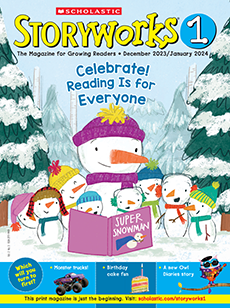My dog Spot has dots.

Spot's Dots
Read a silly story filled with decodable words.
Standards
Rosa Jay/Shutterstock.com

Olga Bilevich/Alamy Stock Photo (Shaking Dog); Eric Isselee/Shutterstock.com (Spotless Dog)
Oh no! Now Spot has no dots.

Gelpi/Shutterstock.com (Binoculars); viki2win/Shutterstock.com (Confused Dog)
Where are his dots?

Fishman64/Shutterstock.com (Balloons); Emin Ozkan/Shutterstock.com (Hand)
Are those his dots?
No, they are not.

Bill Livingstone/Shutterstock.com
Here are duck dots.
They do not belong on Spot.

irin-k/Shutterstock.com
This bug has dots.
But my dog does not.
Poor Spot.

vvoe/Shutterstock.com (Paint Brush); Gelpi/Shutterstock.com (Child)
Here, Spot. I have your dots.

JStaley401/Shutterstock.com
My dog Spot got new dots. He has a lot.
Implementation Suggestions
Small Group
- Decodable texts are controlled for specific phonics patterns. This decodable story focuses on the phonics pattern -ot. Match students who might need practice with this pattern for a small-group phonics lesson and reading.
Small Group
Pairs, Independent Reading
- For children who have moved beyond this pattern, “Spot’s Dots” is a fun story to read independently or with a partner. Have children read it multiple times to practice fluency and comprehension.
Using Storyworks 1 Step-by-Step
Reading, Critical Thinking, and Skill Building
1. Before Reading
Preview -ot and high-frequency words (10-15 minutes)
- Do a mini phonics lesson on -ot words. Work with children to blend the sounds of the words. Begin with the title. Model decoding by reading each word slowly. Then model fluency by reading quickly. Explain that many of the words in this story will end with the -ot sound.
- Have students do a fast read to practice the -ot words. The purpose is for them to read without sounding out every letter. Encourage students to do a second fast read if necessary.
- Review any sight words from the story. You might encourage advanced readers to do a fast read of the sight words.
Preview the Story and Set a Purpose for Reading (3-10 minutes)
- Set a purpose for reading. Let students look at the pictures and designs. What do they think this story will be about? Tell children that this is a very silly story about a dog with spots. They are going to read to find out what happens to his spots.
2. Read the Story (15-20 minutes)
- As children read, prompt them to make predictions. What will happen next? What will the girl do?
- Have children read the story again on their own. They can go through the text and highlight -ot words in the text. Then have them circle the high-frequency words.
3. After Reading: Focus on Skills
ELA Focus: Building Comprehension (15 minutes)
- Pass out the What Has Dots? printable.
- Ask students: What happened to Spot’s dots at the beginning of the story? (He lost them!)
- Students will reinforce their understanding of this main event by drawing an animal with dots and without dots.
Reading Focus: Decodable Words (20 minutes)
- Use the Meet the -ots! printable to develop students’ skills for decoding a consonant-vowel-consonant word family.
- Children will practice reading and writing -ot words based on pictures they see.
